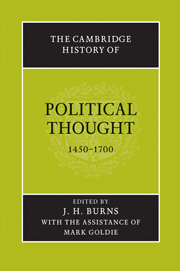Book contents
- Frontmatter
- Introduction
- I Renaissance and Counter-Renaissance
- II Religion, civil government, and the debate on constitutions
- III Absolutism and Revolution in the Seventeenth Century
- IV The end of Aristotelianism
- V Natural law and utility
- Conclusion
- Biographies
- Bibliography
- Index of names of persons
- Index of subjects
Introduction
Published online by Cambridge University Press: 28 March 2008
- Frontmatter
- Introduction
- I Renaissance and Counter-Renaissance
- II Religion, civil government, and the debate on constitutions
- III Absolutism and Revolution in the Seventeenth Century
- IV The end of Aristotelianism
- V Natural law and utility
- Conclusion
- Biographies
- Bibliography
- Index of names of persons
- Index of subjects
Summary
The political ideas examined in this volume were generated in a period that requires its historians, in an especially marked degree, to ‘look before and after’. A watershed between ‘medieval’ and ‘modern’ European history has conventionally been located in the late fifteenth century and the beginning of the sixteenth – the period which saw the final eclipse of the Byzantine Empire, the flowering of the humanist Renaissance, and the first stages of the Protestant Reformation. Yet the society of the three centuries following that period has increasingly been represented as a ‘world we have lost’ – a world essentially pre-modern because pre-industrial (at least in terms of what Marx called ‘machinofacture’) and pre-capitalist (if by ‘capitalist’ we mean to refer to a society having an urban proletariat as a major characteristic). Demographically, the population explosion accompanying the social transformations of the eighteenth and nineteenth centuries brought into being mass societies of an unprecedented kind. In political terms, it is true, there may seem to be less reason to question the modernity of the period here under scrutiny. There is a genuine sense in which the ‘sovereign state’ – even if its lineaments are more clearly discernible in medieval Europe than has sometimes been supposed – took firmer shape in and after the sixteenth century. Yet even here the need to distinguish an ‘early modern’ from a later phase is evident. The European nation-state of the nineteenth and twentieth centuries is a very different entity from the typically dynastic states (or the surviving republics) of that Ancien Régime which was shaped in the period with which we are here concerned.
- Type
- Chapter
- Information
- Publisher: Cambridge University PressPrint publication year: 1991
- 1
- Cited by



